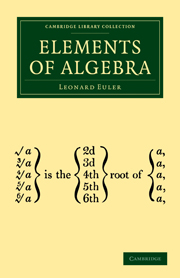Book contents
- Frontmatter
- ADVERTISEMENT
- MEMOIR OF THE LIFE AND CHARACTER OF EULER, BY THE LATE FRANCIS HORNER, ESQ., M. P.
- ADVERTISEMENT BY THE EDITORS OF THE ORIGINAL, IN GERMAN
- ADVERTISEMENT BY M. BERNOULLI, THE FRENCH TRANSLATOR
- Contents
- PART I Containing the Analysis of Determinate Quantities
- SECTION I Of the Different Methods of calculating Simple Quantities
- Chap. I OF Mathematics in general
- Chap. II Explanation of the signs + plus and − minus
- Chap. III Of the Multiplication of Simple Quantities
- Chap. IV Of the nature of whole Numbers, or Integers with respect to their Factors
- Chap. V Of the Division of Simple Quantities
- Chap. VI Of the properties of Integers, with respect to their Divisors
- Chap. VII Of Fractions in general
- Chap. VIII Of the Properties of Fractions
- Chap. IX Of the Addition and Subtraction of Fractions
- Chap. X Of the Multiplication and Division of Fractions
- Chap. XI Of Square Numbers
- Chap. XII Of Square Roots, and of Irrational Numbers resulting from them
- Chap. XIII Of Impossible, or Imaginary Quantities, which arise from the same source
- Chap. XIV Of Cubic Numbers
- Chap. XV Of Cube Roots, and of Irrational Numbers resulting from them
- Chap. XVI Of Powers in general
- Chap. XVII Of the Calculation of Powers
- Chap. XVIII Of Roots with relation to Powers in general
- Chap. XIX Of the Method of representing Irrational Numbers by Fractional Exponents
- Chap. XX Of the different Methods of Calculation, and of their Mutual Connexion
- Chap. XXI Of Logarithms in general
- Chap. XXII Of the Logarithmic Tables that are now in use
- Chap. XXIII Of the Method of expressing Logarithms
- SECTION II Of the different Methods of calculating Compound Quantities
- SECTION III Of Ratios and Proportions
- SECTION IV Of Algebraic Equations, and of the Resolution of those Equations
- PART II Containing the Analysis of Indeterminate Quantities
- ADDITIONS BY M. DE LA GRANGE
Chap. XVI - Of Powers in general
Published online by Cambridge University Press: 05 July 2011
- Frontmatter
- ADVERTISEMENT
- MEMOIR OF THE LIFE AND CHARACTER OF EULER, BY THE LATE FRANCIS HORNER, ESQ., M. P.
- ADVERTISEMENT BY THE EDITORS OF THE ORIGINAL, IN GERMAN
- ADVERTISEMENT BY M. BERNOULLI, THE FRENCH TRANSLATOR
- Contents
- PART I Containing the Analysis of Determinate Quantities
- SECTION I Of the Different Methods of calculating Simple Quantities
- Chap. I OF Mathematics in general
- Chap. II Explanation of the signs + plus and − minus
- Chap. III Of the Multiplication of Simple Quantities
- Chap. IV Of the nature of whole Numbers, or Integers with respect to their Factors
- Chap. V Of the Division of Simple Quantities
- Chap. VI Of the properties of Integers, with respect to their Divisors
- Chap. VII Of Fractions in general
- Chap. VIII Of the Properties of Fractions
- Chap. IX Of the Addition and Subtraction of Fractions
- Chap. X Of the Multiplication and Division of Fractions
- Chap. XI Of Square Numbers
- Chap. XII Of Square Roots, and of Irrational Numbers resulting from them
- Chap. XIII Of Impossible, or Imaginary Quantities, which arise from the same source
- Chap. XIV Of Cubic Numbers
- Chap. XV Of Cube Roots, and of Irrational Numbers resulting from them
- Chap. XVI Of Powers in general
- Chap. XVII Of the Calculation of Powers
- Chap. XVIII Of Roots with relation to Powers in general
- Chap. XIX Of the Method of representing Irrational Numbers by Fractional Exponents
- Chap. XX Of the different Methods of Calculation, and of their Mutual Connexion
- Chap. XXI Of Logarithms in general
- Chap. XXII Of the Logarithmic Tables that are now in use
- Chap. XXIII Of the Method of expressing Logarithms
- SECTION II Of the different Methods of calculating Compound Quantities
- SECTION III Of Ratios and Proportions
- SECTION IV Of Algebraic Equations, and of the Resolution of those Equations
- PART II Containing the Analysis of Indeterminate Quantities
- ADDITIONS BY M. DE LA GRANGE
Summary
168. The product which we obtain by multiplying a number once, or several times by itself, is called a power. Thus, a square which arises from the multiplication of a number by itself, and a cube which we obtain by multiplying a number twice by itself, are powers. We say also in the former case, that the number is raised to the second degree, or to the second power; and in the latter, that the number is raised to the third degree, or to the third power.
169. We distinguish those powers from one another by the number of times that the given number has been multiplied by itself. For example, a square is called the second power, because a certain given number has been multiplied by itself; and if a number has been multiplied twice by itself we call the product the third power, which therefore means the same as the cube; also if we multiply a number three times by itself we obtain its fourth power, or what is commonly called the biquadrate: and thus it, will be easy to understand what is meant by the fifth, sixth, seventh, &c. power of a number. I shall only add, that powers, after the fourth degree, cease to have any other but these numeral distinctions.
- Type
- Chapter
- Information
- Elements of Algebra , pp. 48 - 52Publisher: Cambridge University PressPrint publication year: 2009First published in: 1822



